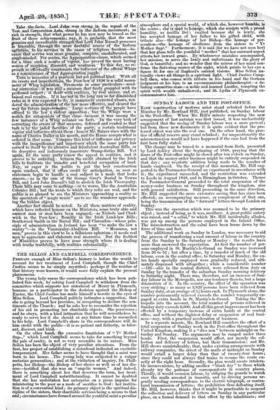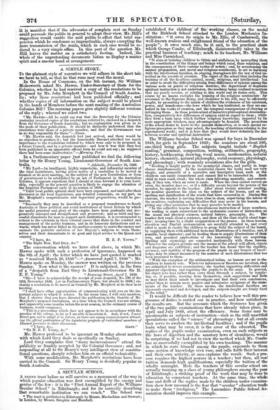SITNDAX-EABOUR AND Tin: , POST-OFFICE.
RAsn co Struction of motives waist 'stand rebuked before the k Nliiitter ' ' Mr. RoWrand int i just prtblished; on Sunday labour in the Pos 'office.. When Mi. Hill's minute respecting the new arrangercient Of hisCbutiiich was iliet issued, it was uncharitably suggested that the saying of Sunday labour *Ili a inure pretext ; but frOni .these new" documents it is quite evident that the pro- . fessed object was 'also the real one. On the other hand, the prac- tice of Official -reserve may stand rebuked ; for imquestionably the miscoristilliction would not have happened if the case had from the first been fully stated. The change may be triteed to a memorial front Bath, presented by Lord .A.shley about the beginning; of 1848, praying that the doors Of the Post-office might be closed after ten o'clock on Sunday, and that the money-order business might be entirely suspended on that day ; any requisite addition being made to the number of hands -employed. On the receipt of this memorial, Mr. Hill sug- gested to the Postniaster.-Gcneral an experiment in accordance with it ; the experiment sue-ceded, and the restriction was extended to Leeds in August 1848, and to Birmingham in October. Thence the Postmaster-General proceeded to the total suspension of the money-order business On Sunday throughout the -kingdom, also with general -satisfaction. Still proceeding in the same direction, Mr; Hill suggested the more extensive saving that has since been effected; an accompanying measure, or complement of that one, being the transniismon a the "forward" letters through London on Sunday.
This was the Operation which was assumed to be the primary object ; instead of being, as it was, ancillary. A great public outcry was raised, and "a cabal," to which Mr. Hill incidentally alludes, was got up among the persons employed in the Inland Office. The misconstruction and the cabal have been borne down by the force of time and fact.
The additional work on Sunday in London, Was necessary to aid the process of transferring a vast amount of labour in the country from the Sunday tothe Saturday or Monday : the results have more than answered the expectation. At first the number of per- sons employed in St. Martin's-le-Grand on Sunday was increased from 26 to 52 ; but after a time, by a transfer of much of the old labonr, even in the central office, to Saturday and Monday, the ex- tra Lands .specially employed were gradually reduced, and ulti- mately dispensed with altogether ; while a considerable number —191—also in the central district, were released from duty on Sunday by the transfer of the suburban Sunday morning delivery to Saturday night. There was, therefore, not an increase of Sun- day.labour in the Metropolis, nor any tendency thereto, but a large diminution of it. In the country, the effect of the operation Was very striking : as many as 5,829 persons have been relieved from Sunday duty, at average of 51 hours each. In Plymouth alone, the number permanently relieved exceeds the number temporarily en- gaged itS extra hands in St. Martin's-le-Grand. Taking the Me- tropolis into the account, the total number of persons relieved in Sunday duty exceeds 6,000. And all this great improvement has been effected by a temporary increase of extra hands at the central office, and without the slightest delay or suspension of real busi- ness—nay, with a .practical acceleration of business.
In a separate minute, Mr. Rowland Hill considers the effect of a total suspension of Sunday work in the Post-office throughout the United Kingdom, making it a "dies non" between midnight on Sa- turday and Sunday. The arguments may be ranged under three heads. First, the suspension would affect, not merely the col- lection and delivery of letters, but their transmission; and Mr. Hill shows unmistakeably, that, under existing arrangements with railway companies, the arrest of the mails at midnight on Sunday would entail a larger delay than that of twenty-four hours; since they could not always find trains to resume the route ex- actly at the right hour. Secondly, the plan would create intolera- ble inconvenience, by adding another "blank day" to those which already try the patience of correspondents in country places. Thirdly, it would occasion labour, by obliging the guards to watch over the mails arrested in transitu, and by driving persons ur- gently needing correspondence to the electric telegraph, or contra- band transmission of letters ; the prohibition thus defeating itself. Mr. Hill, however, thinks that it might be practicable to suspend the collection and delivery of letters on Sunday in any particular place, on a formal demand to that effect by the inhabitants; and
• it is manifest that if the advocates of complete rest on Sunday .could persuade the public in general to adopt theirriew, Mr. Will's suggestion would enable the said public to effect that total sus- pension which _he condemns as impracticable, always excepting the mere transmission of the mails, which in such case would be re- duced to a very simple office. In this part of the question Mr. 31ill leaves the matter on a satisfactory footing. Indeed, :the whole of the unpretending documents before us display a master -spirit and-a master hand at arrangement.



























 Previous page
Previous page